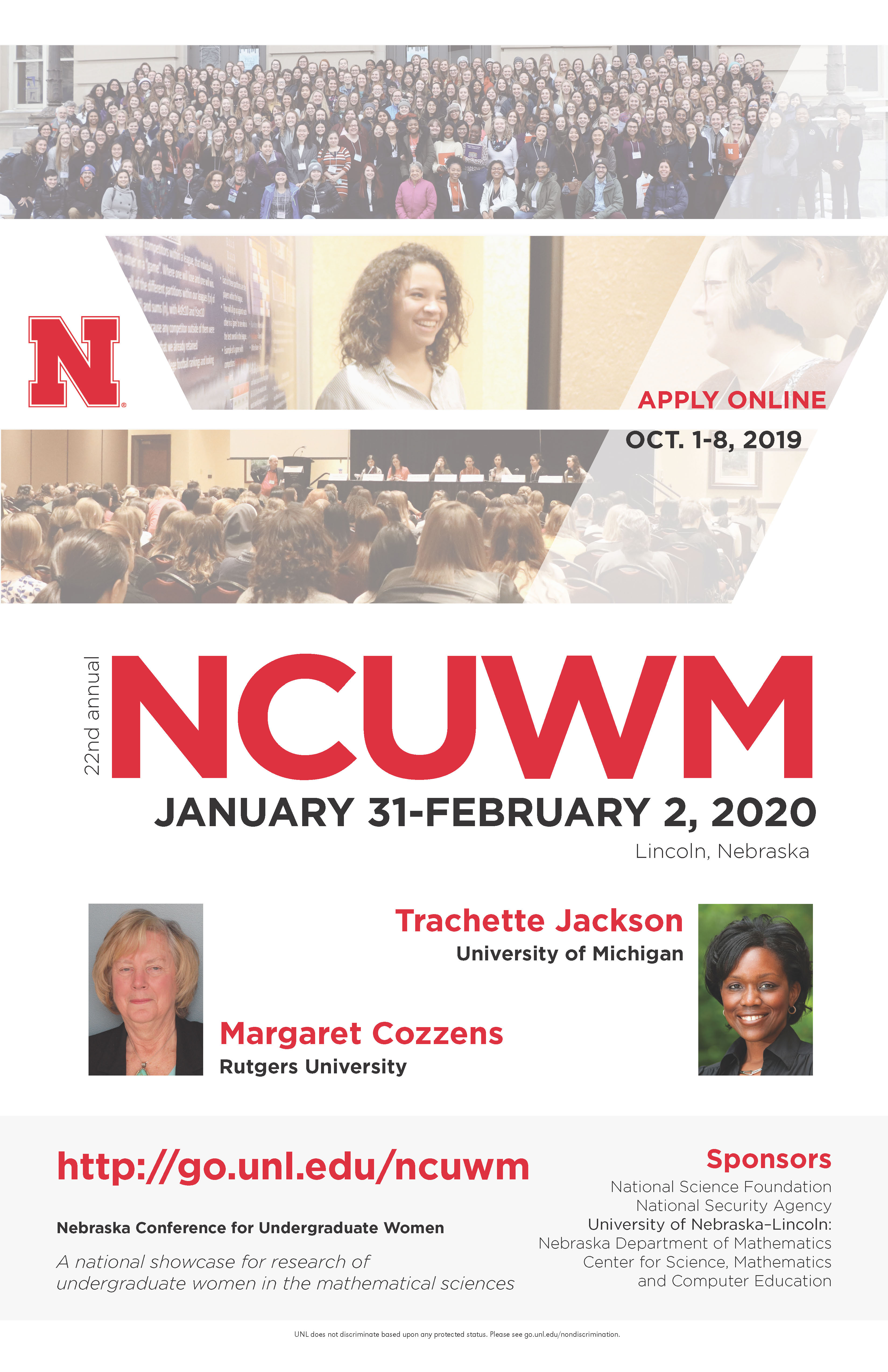
22nd Annual Nebraska Conference for Undergraduate Women in Mathematics
January 31 - February 2, 2020
The 22nd Annual Nebraska Conference for Undergraduate Women in Mathematics (NCUWM) will be held January 31-February 2, 2020. Conference activities on Friday will occur on the university’s city campus and on Saturday and Sunday at the Embassy Suites Lincoln Downtown Hotel (1040 P Street, 402-474-1111), a short walk in downtown Lincoln. The Conference is open to outstanding undergraduate women, including trans women and non-binary women, mathematicians at all stages of their careers. Students will have the opportunity to meet other women who share their interest in the mathematical sciences, and those who already have done research will be given an opportunity to present their results.
NCUWM's overall goal is to arm participants with knowledge, self-confidence and a network of peers to help them become successful mathematicians. We do this by providing role models, insider knowledge and an opportunity to present original research. Our focus is to encourage and mentor undergraduate women to pursue graduate study in mathematics and seek mathematical careers. Conference participants also will have a chance to learn about life in graduate school from the perspective of current women graduate students representing math departments from across the country.
As a current Math major, you are invited to attend any of the conference sessions and plenary talks except for any event with food. Even though this conference focuses on women, any student is welcome to attend regardless of gender or sexuality. The plenary talks will be on Friday, January 31 from 3:40 to 6:05 pm in the Nebraska City Campus Union Auditorium and Saturday, February 1 from 1:45 to 2:40 pm in the Regents Ballroom BC of the Embassy Suites Lincoln Downtown Hotel. You can find a full conference schedule here: http://www.math.unl.edu/~ncuwm/22ndAnnual/schedule/.
Plenary Speakers
Dr. Margaret Cozzens
Margaret Cozzens, better known as Midge, is currently Distinguished Professor of Mathematics and Associate Director for Education at DIMACS, the Discrete Mathematics and Theoretical Computer Science Center at Rutgers University. She has been engaged in education for over 50 years, from teaching high school math, to chair of Northeastern University’s Mathematics Department, to Division Director for ESIE at NSF, Provost at the University of Colorado Denver, and President of the Colorado Institute of Technology. She has led curriculum development projects in BioMath, Computational Thinking and Sustainability, and is the PI for the Computational Thinking Online Professional Development project and the Planning for a Sustainable Future project. She is the author of nearly 100 research publications including five books and four book chapters in areas of graph theory, biomath, cryptography, and math psychology.
Dr. Trachette L. Jackson
Trachette L. Jackson is a Professor of Mathematics at the University of Michigan, who specializes in Computational Cancer Research or Mathematical Oncology. With an eye towards addressing critical challenges associated with cancer therapeutics, much of Dr. Jackson’s research is aimed at developing multiscale mathematical models that are designed to optimize the use of anticancer agents that specifically target active molecular pathways that cancer cells use to promote their growth and survival. Dr. Jackson is an award-winning educator and scholar who has been honored for her accomplishments in both areas. In 2003, she became the second African American woman to receive the prestigious Alfred P. Sloan Research Award in Mathematics; in 2005 she received the James S. McDonnell 21st Century Scientist Award; in 2008 Diverse Magazine honored her as one of the year’s Emerging Scholars. In 2010 she received the Blackwell-Tapia Prize, which biannually recognizes a mathematician for both their research achievements and for their contributions to addressing diversity in mathematics. Dr. Jackson has built her career on collaborative research and educational activities that cut across traditional disciplinary boundaries and envisions that this type of team science will eventually change the face of cancer research.